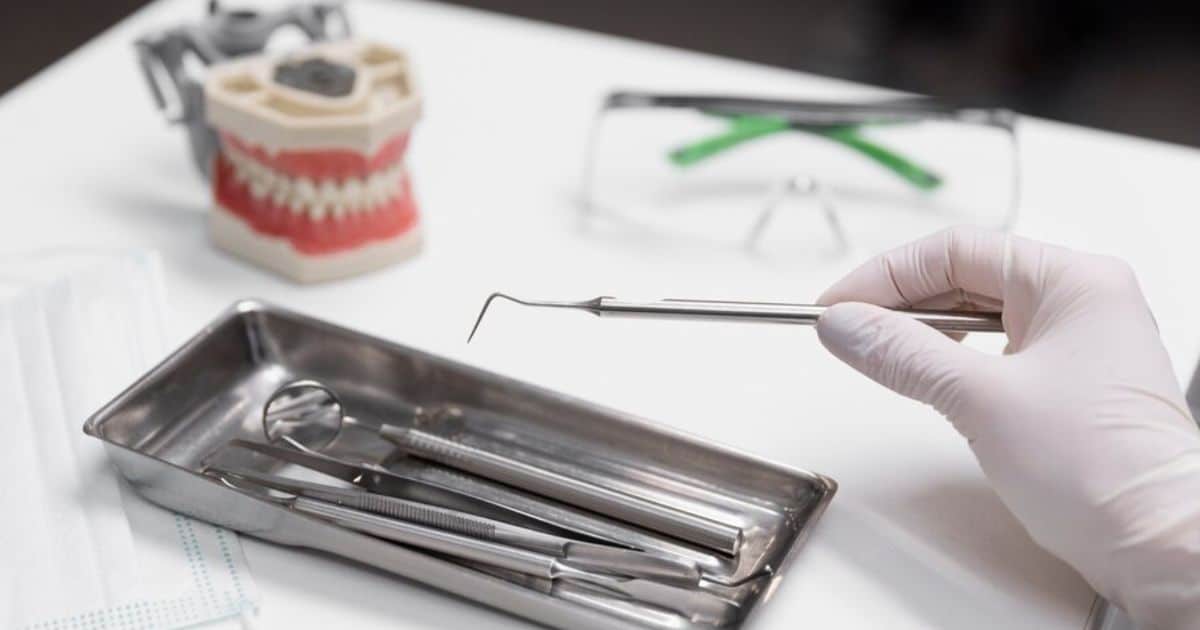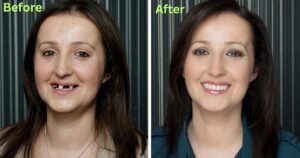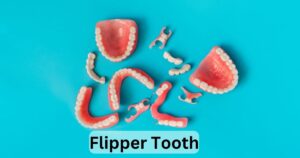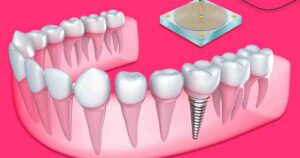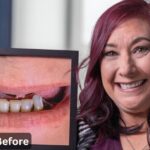Dentures can be expensive investments. However, with daily wear and tear, you may one-day face cracks, loose teeth, or breaks that seem to ruin them. While visiting your dentist is the best option for professional repairs, sometimes you need a quick fix to tie you over for a few days or weeks. This is where denture repair kits can temporarily patch chips and cracks until you can get a dental appointment.
What Exactly is a Denture Repair Kit?
A denture repair kit refers to a product used to mend broken areas, secure loose teeth, or fill gaps in dentures. These affordable kits are available at most pharmacies and generally contain:
- Adhesives – powder or paste forms to bind pieces together
- Replacement teeth – plastic or porcelain teeth to substitute for fallen-out ones
- Wax – used to patch small holes and smooth over repairs
- Pliers or clasps – help insert and secure new teeth or parts
The adhesive hardens to create a temporary bond. Kits do not permanently repair dentures but rather serve as a quick fix until you can see a dentist.
Top 5 Times To Use a Denture Repair Kit
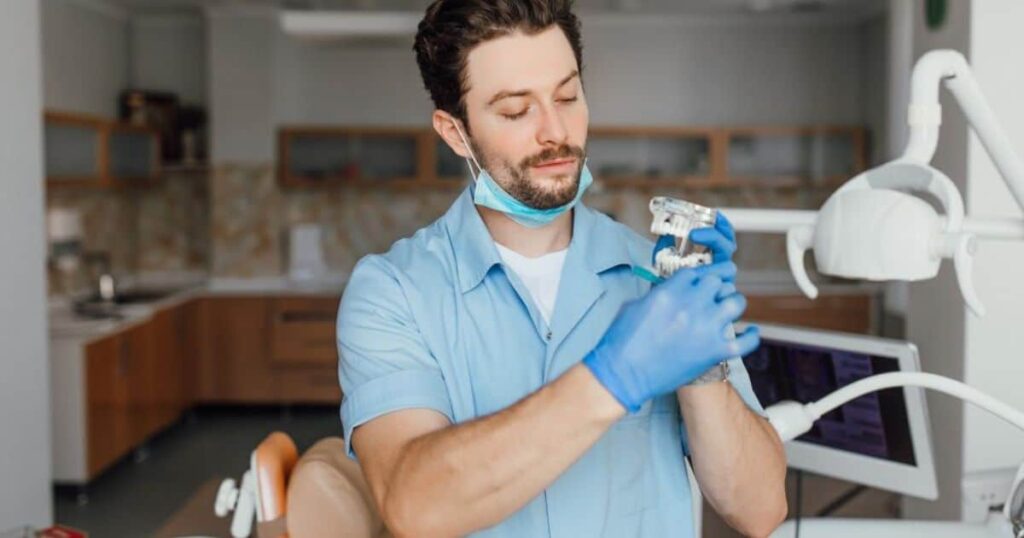
While they should not replace professional care, denture repair kits offer many benefits:
- Minor cracks and chips – Adhesive can patch small fissures in acrylic dentures before they worsen.
- Loose natural teeth – If an existing tooth becomes loose, adhesive may refasten for short-term use.
- Missing tooth replacement – Kits include plastic teeth to insert into empty sockets as a temporary measure.
- Broken areas – Wax and adhesive together can cover fractured spots and recover some function.
- Gaps between teeth – Repair kits can reshape space fillers and fill uneven openings between teeth.
Kits serve as an affordable, rapid solution for minor issues before your scheduled dental visit.
Types of Denture Adhesives
Denture repair kits contain adhesives to bind pieces together. Two main types exist:
Powder Adhesive
- Must be mixed with liquid
- Forms a paste that hardens
- Messy application
- Stronger bond
Non-Powder Adhesive Pads
- Pre-mixed putty form
- No preparation needed
- Cleaner to handle
- Weaker bond than powders
Study each kit’s adhesive formula and benefits to determine the best type for your needs. Generally, powder adhesives form stronger repairs that last longer. However, paste adhesives have easier, less messy application.
Step-By-Step Instructions for Repair Procedure
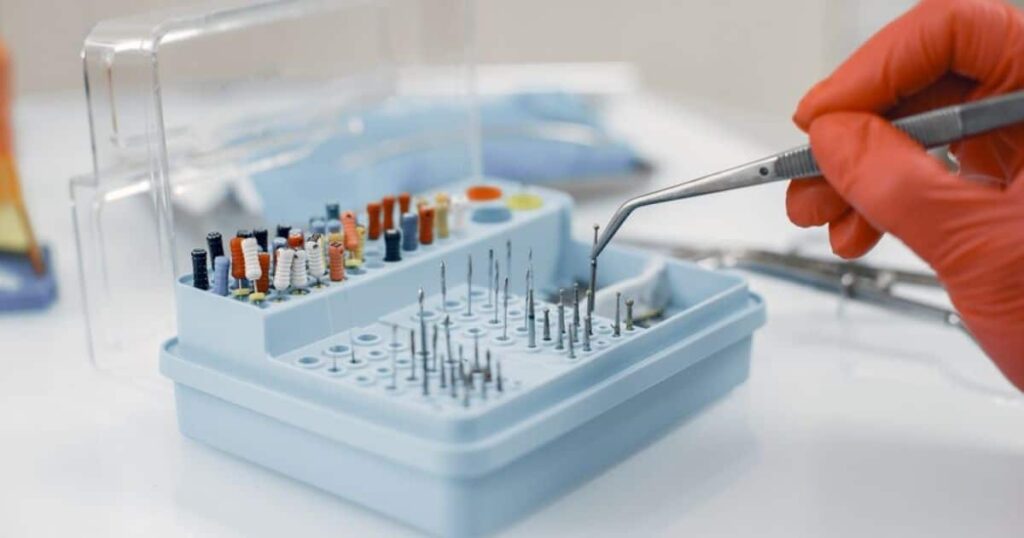
Using most denture repair kits follows a straightforward process:
- Clean dentures thoroughly – Remove all debris, food and plaque first. Soak in denture cleaner if needed.
- Dry completely – Eliminate all moisture or the adhesive will not set properly.
- Mix adhesive – If using a powder formula, combine measured amounts of powder and solution.
- Apply adhesive – Spread a thin, even coat of adhesive onto the denture repair area using putty knife or brush.
- Attach piece – While adhesive remains moist, fit replacement tooth or material firmly into place.
- Allow to fully harden – Let adhesive fully cure as directed on package. Time needed ranges 30 seconds up to 5 minutes.
- Remove excess adhesive – Carefully trim off any overflowing adhesive with metal file, blade or sandpaper once set. Smooth rough spots.
Following package instructions assists proper use for best outcomes. Roughening denture surfaces slightly before applying adhesive can improve bonding.
Handy Tips for Successful Denture Repairs
Using repair kits takes some finesse. Keep these tips in mind:
- Only a thin adhesive coating is needed in repairs. Using excessive amounts can prevent proper hardening.
- Applying adhesive precisely to repair areas without spilling over avoids extra cleanup work later.
- Allowing full curing times listed ensures repairs reach maximum strength.
- Filing, sanding or cutting away any adhesive overflow produces smooth edges that prevent gum irritation.
- Closely following all directions in kit instructions results in long-lasting mends until you see a professional.
Are Denture Repair Kits Right for You?
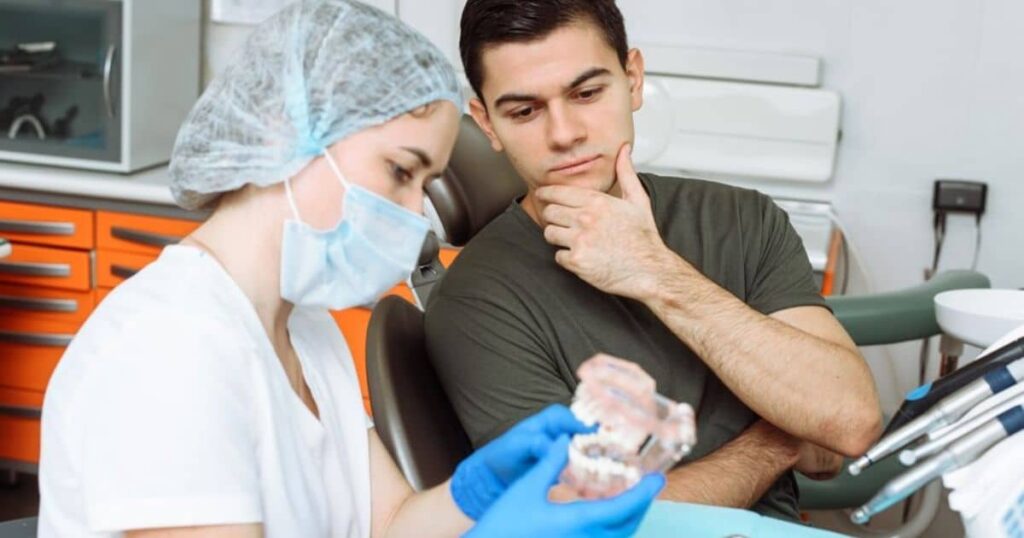
These affordable products provide satisfactory temporary fixes but have limitations:
A good option for slight damage – Minor cracks, chips under 1 inch, or 1-3 detached teeth often end well.
Not suitable for extensive damage – Large cracks over 1 inch across, 4+ missing teeth, or ill-fitting dentures rarely stabilize adequately with repair kits.
Determining whether to use a denture repair kit depends on the extent of damage and the proper fit of your dentures. While they offer satisfactory short-term, emergency repairs, they should not serve as substitutes for adjustments and replacements from dental professionals when needed. Schedule an appointment at the first signs of damage or looseness for proper assessments.
In the meantime, keep a denture repair kit available if you ever face quick fixes until you can visit your dentist. Follow kit directions closely, applying only enough adhesive to temporarily patch chips or insert loose teeth. Handle cured repairs gently. And most importantly, always seek professional follow-up care for any underlying causes of ill-fitting dentures.
FAQ’s
What is used to repair dentures?
Denture repair kits are used to repair cracks or broken parts in dentures. It contains glue and other fixers.
How do you remove denture repair kit glue?
Soak the repaired denture in warm water to loosen the glue. Then gently scrub it off with a toothbrush or denture brush.
What is the strongest adhesive for dentures?
Denture adhesives that contain polymethyl methacrylate (PMMA) are strongest. They bond dentures firmly in place all day.
How long does denture glue last?
Denture glue lasts for many hours, usually around 8-12 hours. But eating, drinking, and oral hygiene affect the duration which may reduce.
Conclusion
Denture repair kits serve as a useful temporary measure when minor damage occurs to your dental prosthetics. The adhesive, wax, and replacement teeth allow you to patch small cracks and chips or recover lost teeth while awaiting professional repair. Just be aware that most kits only provide emergency fixes lasting a few weeks up to a month with careful handling.
While denture repair kits succeed for small fractures under an inch or 1-3 detached teeth, they cannot adequately stabilize extensive damage. Seeking a dental appointment is critical for assessing and correcting the underlying fit and integrity issues causing breakage. Damaged areas larger than an inch, 4+ missing teeth, or ill-fitting dentures often require adjustments and replacements beyond what home kits can achieve.
In the end, keeping an affordable denture repair kit on hand lets you rapidly recover some function if disaster strikes your smile. Just take care not to overuse adhesive or consider it an equal substitute for professional adjustment of major cracking or unbalanced bites over time. Work closely with your dentist to keep your smile intact, while relying on kits for only minor quick fixes in between visits when needed. Together, professional dental care and at-home touch-up maintenance will serve your smile for years of comfortable wear.
